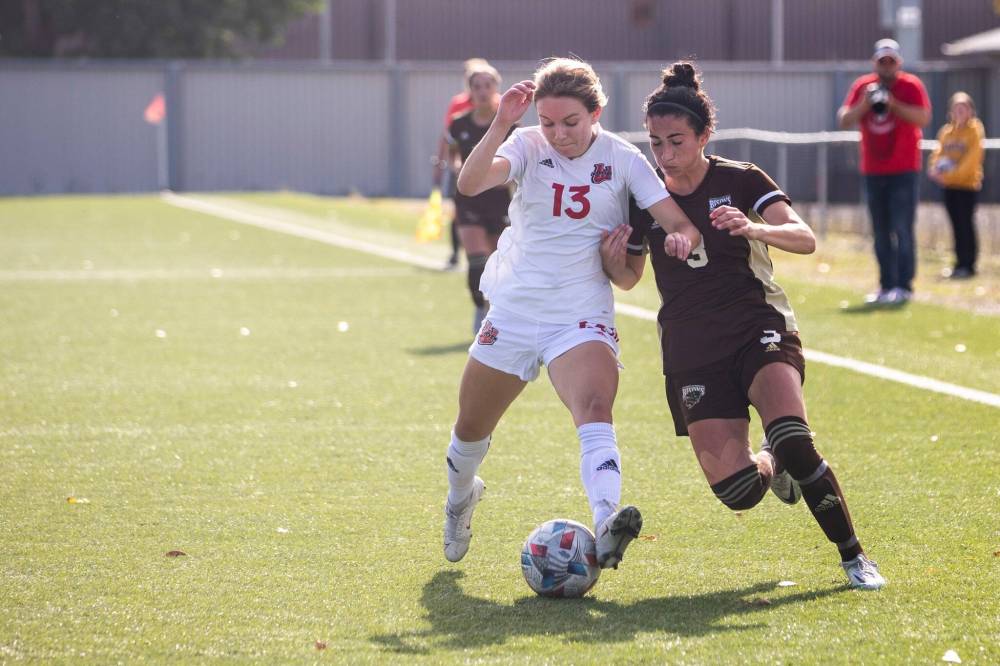THE University of Winnipeg’s soccer team is making a last-minute play to convince decision-makers to reinstate the club via grassroots fundraising.
“If it’s strictly a financial decision, then give us an opportunity to help alleviate that financial burden,” said Jaida Clancy, a defender who was getting ready for her fourth year with the team when a year-long hiatus was announced last week.
Citing budget-related challenges, U of W administration is ending an English language program and suspending its lone soccer team for 2025.

MIKAELA MACKENZIE / FREE PRESS FILES
The University of Winnipeg Wesmen women’s soccer team wants to collect donations to keep the club intact.
Student-athletes have made multiple united appeals to save their sport.
The women initially requested the president and board of regents act on a moral obligation to support gender equality in sports. Since that pitch proved unsuccessful, they want to collect donations to keep the club intact.
“I don’t believe in the financial reasons because of the way the women’s soccer team has been treated over the last 10, 15 years. It’s completely different from the way they treat basketball and volleyball,” said Thiago Bastos, a former assistant coach at the university.
Bastos worked with the Wesmen women in 2022 and during his single season with them, he often took equipment from home — soccer balls, pinnies and cones — due to the limited resources for the program.
He said the cost of running the regular season, which takes place annually in September and October, was roughly $60,000 to $70,000, which is less than the last posted salaries for each of the head coaches of men’s basketball and volleyball.
U of W’s 2023 compensation disclosure report shows that both Mike Raimbault and Larry McKay, who retired from managing campus volleyball in 2024 following a three-decade career with the program, earned $98,009 annually.
Bastos was paid $2,000 for his supporting role on the soccer pitch. Shortly after the season, he left his day job at the Manitoba Soccer Association and Winnipeg, entirely.
“If you want to make a career of soccer, you have to leave (Manitoba). It’s sad because we’re talking about one of the biggest youth sports in Canada,” he said from Calgary on Tuesday.
Bastos noted the cuts at U of W are happening while Canada West recently shortened the women’s soccer season at the same time as the sport has grown among young players.
The former decision wasn’t entirely surprising, given there has been human resources-related uncertainty in the athletics department, he said, adding the women recently spent about six months without a coach.
“I absolutely would have never moved to Manitoba if it wasn’t for the soccer team,” said Clancy, 20.
The defender noted there’s irony in benching the team when Canada is about to launch a professional women’s league with coaches that will all but certainly scan rosters of post-secondary alumni for future recruits.
The Northern Super League kickoff is scheduled for April. There are six clubs: in Calgary, Halifax, Montreal, Ottawa, Vancouver and Toronto.
Multiple sources told the Free Press they suspect the suspension of the Winnipeg Wesmen 2025 season was made in part in retaliation to player concerns levelled against a former trainer that remain unresolved.
Interim head coach Fabio Capone has not responded to multiple requests for comment.
University spokesman Caleb Zimmerman said there was no one who could speak about the subject in an email Tuesday — the same line used previously by Cheryl Parisien, who was handling media relations on Jan. 14 when the news broke.
David Larkins, media co-ordinator for campus athletics, has repeatedly deferred comment to Danielle Dunbar, vice-president of university advancement.
Dunbar redirected a reporter’s inquiries to Zimmerman.
maggie.macintosh@freepress.mb.ca

Maggie Macintosh
Education reporter
Maggie Macintosh reports on education for the Free Press. Originally from Hamilton, Ont., she joined the newsroom as a reporter in 2019. Read more about Maggie.
Funding for the Free Press education reporter comes from the Government of Canada through the Local Journalism Initiative.
Every piece of reporting Maggie produces is reviewed by an editing team before it is posted online or published in print — part of the Free Press‘s tradition, since 1872, of producing reliable independent journalism. Read more about Free Press’s history and mandate, and learn how our newsroom operates.
Our newsroom depends on a growing audience of readers to power our journalism. If you are not a paid reader, please consider becoming a subscriber.
Our newsroom depends on its audience of readers to power our journalism. Thank you for your support.